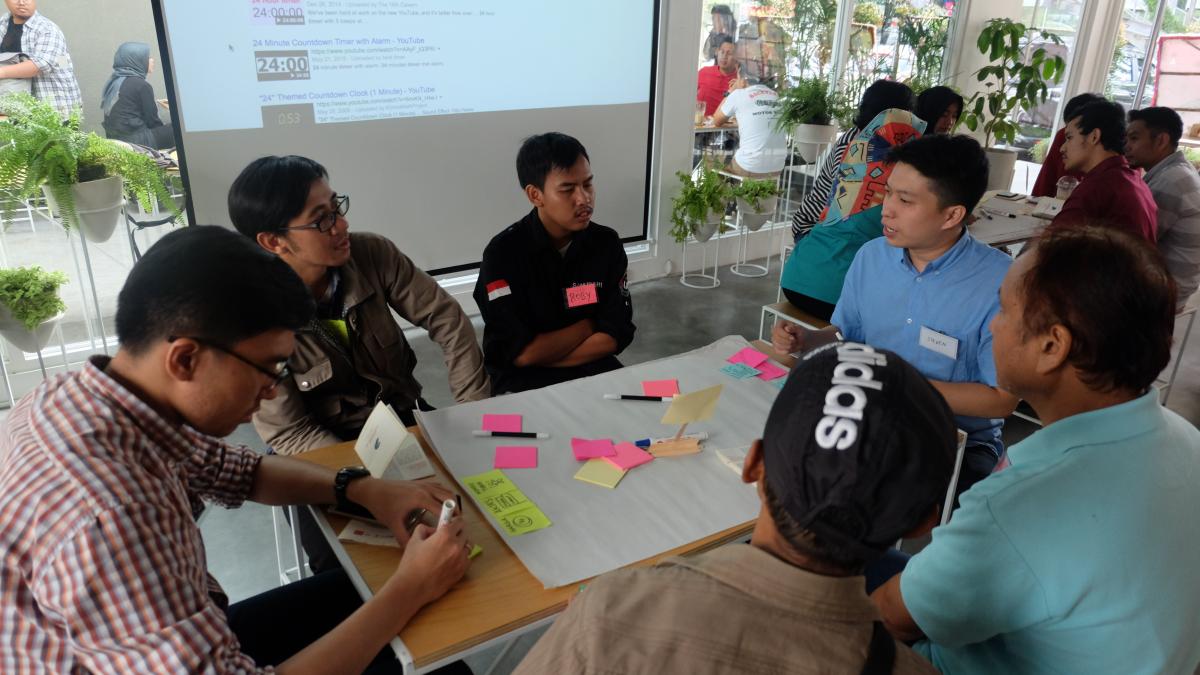Health is unfair. This was the conclusion that Sterhen “Saska” Akbar, Project Coordinator of Riset Indie, came to at the end of the Knowledge Café discussion at the Bandung Food Change Lab talk show and exhibition, held from 23 to 24 November 2017 in Bandung, Indonesia.
This activity is part of Hivos and IIED’s Sustainable Diets for All (SD4All) programme, which prioritizes healthy, diverse and affordable food for all members of society, especially those with low incomes, in this case focusing on the activities and role of street vendors in Bandung.
Not just affordable, but also healthy
The discussion revolved around making sure the food sold to lower income customers by street vendors is not just affordable, but also healthy. Participants mentioned that there are different definitions of healthy food, depending on people’s perceptions, which in turn are shaped by different experiences and knowledge related to health.
“It was very interesting when we introduced the topic to the audience, who had various professions and educational backgrounds. They looked at the same food with different eyes, and this is what determined whether they thought it was healthy or not. At any rate, the discussion raised their awareness, so they could understand the importance of being healthy. However, it is still a long way for many street vendors and their customers,” said Saska.
Mujahidin, a street vendor who was invited to the discussion, said it gave him more knowledge and understanding of health. He also realised the important role he plays in the food networking system. However, street vendors in Bandung face legal problems and challenges to how they can sell their food comfortably and safely.
A laboratory process for solving problems
The Knowledge Café is part of a long “laboratory” process that Indie Research continues to explore as part of the SD4All programme’s campaign in Indonesia. Their Programme Manager, Amanda Mita, told us they have also worked over the last year with the Bandung Institute of Technology’s School of Business and Management. Several groups of students were invited to do research on how street vendors work and how they interact with their customers – mostly from low-income groups. Over the last eight weeks, the students generated five innovative prototypes to address seemingly simple problems that many customers experience when purchasing inexpensive food from street vendors. This process of creating the prototypes formed the basis of the SD4All campaign among youth in Bandung.
“The students were directly involved in the field to observe the problems and find solutions through the prototypes they created. They did not need to solve the difficult problems, just the simple things. The results were then discussed together with various stakeholders, ranging from decision makers to street vendors. In that way, there is communication and understanding,” Amanda Mita explained.
Prototypes
The prototypes include Meli (Meja lipat or folding table) – an idea that emerged as the solution for an iced coconut beverage vendor who could not offer a bench and table for his customers while they queued and waited for service; Kumbah (a simple washing tool) – to help street vendors wash their cutlery hygienically by using water in three small buckets; Street Vendor Health Movement, wa.suh, and Dadang Ramzi (one of the participants’ idea to create a “home chef” in the style of Gordon Ramsay, a famous chef who creates simple yet healthy meals).
Street vendor issue complex, but joint action creates positive change
“This street vendor issue is a complex, multi-dimensional problem that has been around for a long time. As a major player in the food system in Bandung city, street vendors are faced with a dilemma. On the one hand, they provide employment and access to food, especially for middle- and lower-class groups. On the other hand, they are often considered a nuisance to public order and aesthetics, and encroach on open green areas in the city. Therefore, the love-hate relationship between the street vendors and the community is not just an issue of urbanization and aesthetics, but also about the real needs of customers in terms of food affordability,” Mita explained.
Stephen ‘Saska’ Akbar believes that this communal action creates positive changes, because it is difficult to create any change when acting alone and without considering other people’s perspectives and collaboration. “Throughout this exhibition, we want to present alternative ideas and solutions that we’ve collected thus far, while also obtaining feedback on the design,” he added.






